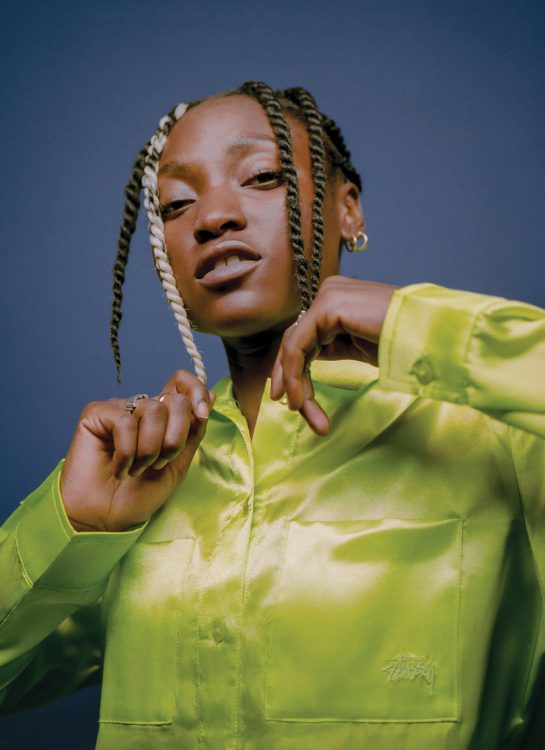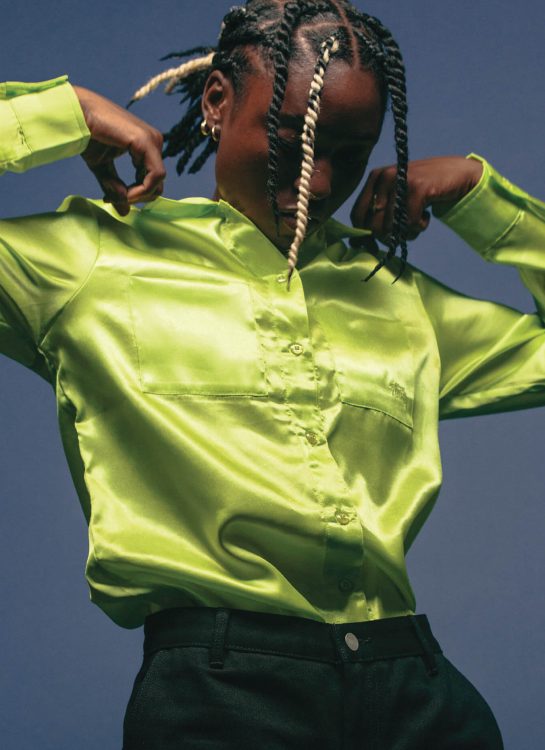- Flohio wears Stussy
- Words Notion Staff
- Photography Ollie Abegboye
- Fashion Beka Moore
- Videography Laurie Boxley
- Words Tara Joshi
- Makeup Shayna Lewis-Fenton
- Photography Assistant Yomi Andewusi
- Fashion Assistant Libby Carradice-French
Over a peppermint tea and blaring chart tunes, we talk about female rap archetypes.
Funmi Ohiosumah, aka. rising MC Flohio, is refusing dessert despite having taken us to an ice cream parlour on her home turf of South London’s Bermondsey Borough. She doesn’t have a sweet tooth, she reiterates with a bemused shrug. So it’s over a peppermint tea and blaring chart tunes that we are talking about female rap archetypes.
I have posited to the 25-year-old that the biggest female rappers right now tend to fall into hyper-effeminate tropes, listing Nicki, Cardi B, and Stefflon Don as exemplars of this. Looking at Flohio, she’s certainly not that. Her aesthetic is decidedly androgynous, and – save for her fiery Nikes and delicate gold jewellery – the rapper is dressed all in black.
That’s not to say she’s not sweet though. The first time we meet it’s because she’s hugging members of the audience after her first headline show; the second, at the opening night of gothic dancehall artist GAIKA’s System installation, where she clasps my hands in emphatic shock at how cold they are. For all her searing presence behind the mic, there’s a soft warmth to Flohio, not least when she keeps running a lint roller over her trousers and hoodie trying to pick off spots of white that don’t exist while laughing bashfully: “Black has to be absolutely spotless. That’s very important, I don’t play about!”.


- Top Cottweiler
In any case, she’s quick to counter my point about rappers: “But on the flipside, you have like Mz Bratt, flipping Missy – and they obviously didn’t follow the form of what a female rapper was meant to be, and they still smashed it. So when you started saying that, my eyes kind of opened, because that’s the path I’m on. Challenging the stereotype, paving a way – when you come with this whole martian wave, this whole different style, it’s like a whole artistry.”
In earnest, Flohio’s path does seem that of an outlier. Though she’s been rapping for years, her initial breakthrough came via her work with London-based production duo God Colony back in 2016 – notably on gargantuan track “SE16”. It was clear even then that she didn’t really sound like any of her contemporaries; UK, US or otherwise. The hurtling vitality of her flow, matched now with expansive, brash, metallic electronics from her go-to producer HLMNSRA (it’s “hello my name is Ra”, FYI), sets her apart from her local peers in the realms of grime, afrobashment, and drill. It’s also a far cry from the choppy, flute-laden swirl of trap that’s dominating the States.
There’s a defiant, precise and lightning-paced energy to Flohio’s bars that ultimately puts her into that “alternative”, underground side of British rap (see also: Kojey Radical, Denzel Himself, slowthai). That said it’s still very much her own vibe, to the point where she was singled out by Naomi Campbell for Vogue as one of “10 women changing our future”. With her Wild Yout EP about to drop, as well as a forthcoming collaboration with Mura Masa in the works, Flohio’s vibrant and distinctive voice looks set to dominate UK rap’s future – but her story starts well before “SE16”.
Flohio for Notion 81
Born in Nigeria, Flohio recalls a childhood soaking up a myriad of sounds, notably afrobeats: “I was one of those kids always walking around in the streets, so what do you hear when you’re out in the street? The ambience of car radios, whatever people in the shops are playing… or people would have their doors open because it’s hot – so you would see or hear what they were watching or listening to”, she laughs, “And no one’s going to send you away, no one’s gonna ask what you’re doing.”
She’s enthusiastic as she speaks, talking about how otherwise she was just listening to what her parents were into (Fela Kuti and Celine Dion have both been mentioned), as well as the artists she was seeing on TV: “I would see B2K on TV, but back then I never knew it was B2K.”
It would be some years after her London arrival aged eight that Flohio would discover who exactly Omarion and co. were. Via a stint in Peckham, she and her family relocated to Bermondsey, SE16 – a place that would prove integral to Flohio’s artistry.
“Do I write about SE16 a lot?”, she grins now, “I do innit! Do I have to stop?”
She answers her own question before I have time to reply: “No, ‘cos Kendrick raps about Compton non-stop. YG, The Game, they all rap about Compton. So no one ever @ me about SE16! For me, everything started in SE16.”
Specifically, SE16 is where the Salmon Youth Club is. Down the road from where we’re sitting, “Salmon” is the space which provided the young MC and her peers a place to meet-up and create. Crucially, it had a recording studio that would also prove a formative ground to other local rising MCs like Ms Banks. Flohio talks about her time at both Salmon and “Fisher” (the Downside Fisher Youth Club near Tower Bridge) with palpable fondness, reminiscing about open mic events she would run, and the first time she rapped – she can’t remember which Lil’ Wayne track it was anymore, but still feels very indebted to him artistically: “you can hear Wayne in every single one of us young rappers – different parts of him in different people.”
It was also during her time in both Salmon and Fisher that TRULUVCRU, the collective she is part of, was formed. TRULUV are still together, she explains, but just pushing their individual projects: “When the time is right we’re all gonna come back to the hub… From ten years ago, we’re still friends: we’re all still doing what we were doing then, but… we’re actually doing it.”

- Top Stussy

- Top Stussy
- Trousers Carhartt WIP

